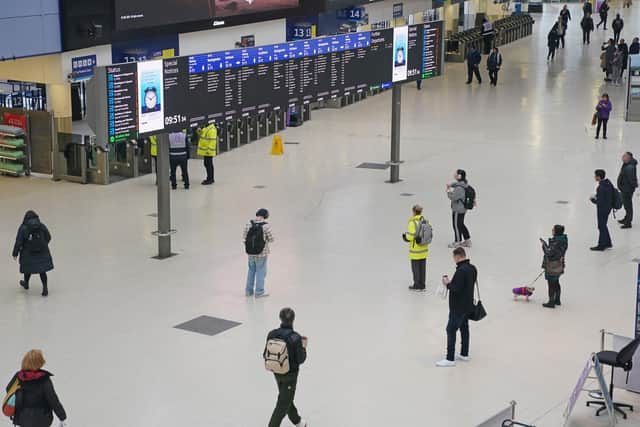Train drivers earning nearly £60k need to end the strikes, they’re only damaging the rail network - Andrew Vine
Northern is recruiting drivers, 108 of them, and the wages on offer amount to the most stinging rebuke possible to the thick-headed militancy that has regularly brought trains to a halt for the past 20 months, and will again next week.
After training, those drivers will earn £54,500 a year. This is in a county where the average annual wage is just over £30,000. With overtime, the drivers will easily double that regional average.
Advertisement
Hide AdAdvertisement
Hide AdPoor them. The heart bleeds. How can anybody possibly scrape by on a measly £60k a year?


Little wonder that the travelling public has not a shred of sympathy for never-ending strikes by the drivers’ union, Aslef, and the whingeing of its leadership about not having received a pay rise for five years.
A basic of £54,500 after a 64-week training period during which the pay will be £23,000. Just how much do these people want?
There are senior executives at any number of organisations – both public and private - around Yorkshire who don’t earn £54,000. And it is certain that a majority of the commuters inconvenienced by strikes can only dream of being paid that much.
Advertisement
Hide AdAdvertisement
Hide AdIn an era when people with full-time jobs are reduced to using food banks, a group of workers earning more than £50,000 a year complaining that it isn’t enough is a sick joke.
The train drivers and their union are clinging stubbornly to a mindset that is half-a-century out of date. The degree of militancy displayed by refusing to negotiate and repeatedly striking – long after the point where they can ever possibly recoup wages already lost from not working – belongs to the 1970s, not 2024.
But if Aslef is nostalgic for that bygone age when union muscle regularly brought the country to a standstill and made governments quake in their boots, it ought to remember the consequences of industries going bust and mass job losses.
Those voting repeatedly to stop the trains running should be in no doubt that they are slowly strangling to death the industry that rewards them handsomely.
Advertisement
Hide AdAdvertisement
Hide AdIt takes a very special sort of warped logic to press on with strikes that discourage people from using trains at the very point when the most fundamental challenge facing the railways is a fall in passenger numbers.
Aslef may be stuck in the past, but the country and the railways are not. Changed working patterns as a result of the pandemic mean fewer people are using the trains.
The price being paid for that, according to the Rail Delivery Group, is a weekly subsidy of £54m to keep the railways running.
That can’t go on forever. To survive – let alone prosper – the railways and the people they employ will have to change.
Advertisement
Hide AdAdvertisement
Hide AdFar from discouraging even more people from using trains by making their lives difficult, Aslef should be grateful its members are getting a very good wage and doing all it can to ensure that remains the case by supporting the industry, not undermining it.
But no. Cynically, and with the aim of causing the greatest disruption, the union has not only targeted people trying to get to and from work, but weekend leisure travellers who have been one of the most valuable growth areas for rail operators in recent years.
The legacy of months of strikes was plain when I caught a Saturday lunchtime train from Leeds to Ilkley a couple of weeks ago.
Traditionally this was always a busy service, full of people heading for an afternoon out in one of our loveliest Dales towns, whether to browse the shops, have a stroll along the banks of the Wharfe, or walk on the moor.
Advertisement
Hide AdAdvertisement
Hide AdNot any longer. There was hardly anybody on board, and it isn’t hard to work out why. People are driving instead because they’ve given up on trains that repeatedly haven’t run.
And they won’t be running again in Yorkshire on April 5, when our three principal operators, Northern, TransPennine Express and LNER are affected by the next strike.
With every day that passengers are messed about by Aslef, more of them must resolve to find an alternative means of getting where they need to go. And so numbers fall a little further, and the financial problems faced by the railways increase.
Knowing how much the striking drivers are already being paid makes the stoppages all the more infuriating.
Comment Guidelines
National World encourages reader discussion on our stories. User feedback, insights and back-and-forth exchanges add a rich layer of context to reporting. Please review our Community Guidelines before commenting.